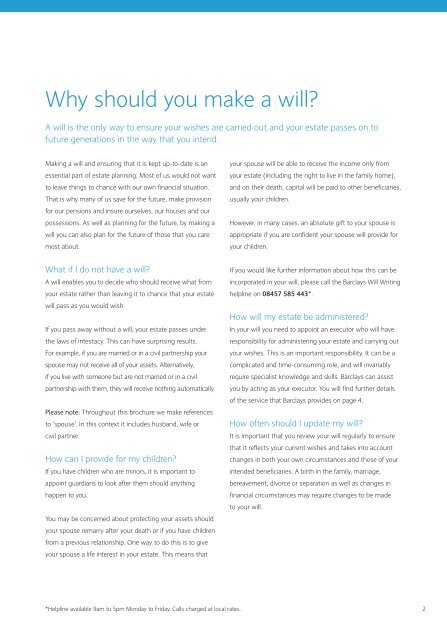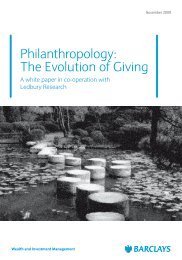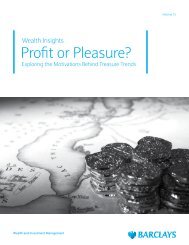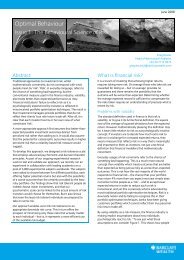BARCLAYS WEALTH ESTATES & TRUSTS
BARCLAYS WEALTH ESTATES & TRUSTS
BARCLAYS WEALTH ESTATES & TRUSTS
Create successful ePaper yourself
Turn your PDF publications into a flip-book with our unique Google optimized e-Paper software.
Why should you make a will?<br />
A will is the only way to ensure your wishes are carried out and your estate passes on to<br />
future generations in the way that you intend.<br />
Making a will and ensuring that it is kept up-to-date is an<br />
essential part of estate planning. Most of us would not want<br />
to leave things to chance with our own financial situation.<br />
That is why many of us save for the future, make provision<br />
for our pensions and insure ourselves, our houses and our<br />
possessions. As well as planning for the future, by making a<br />
will you can also plan for the future of those that you care<br />
most about.<br />
What if I do not have a will?<br />
A will enables you to decide who should receive what from<br />
your estate rather than leaving it to chance that your estate<br />
will pass as you would wish.<br />
If you pass away without a will, your estate passes under<br />
the laws of intestacy. This can have surprising results.<br />
For example, if you are married or in a civil partnership your<br />
spouse may not receive all of your assets. Alternatively,<br />
if you live with someone but are not married or in a civil<br />
partnership with them, they will receive nothing automatically.<br />
Please note: Throughout this brochure we make references<br />
to ‘spouse’. In this context it includes husband, wife or<br />
civil partner.<br />
How can I provide for my children?<br />
If you have children who are minors, it is important to<br />
appoint guardians to look after them should anything<br />
happen to you.<br />
You may be concerned about protecting your assets should<br />
your spouse remarry after your death or if you have children<br />
from a previous relationship. One way to do this is to give<br />
your spouse a life interest in your estate. This means that<br />
*Helpline available 9am to 5pm Monday to Friday. Calls charged at local rates.<br />
your spouse will be able to receive the income only from<br />
your estate (including the right to live in the family home),<br />
and on their death, capital will be paid to other beneficiaries,<br />
usually your children.<br />
However, in many cases, an absolute gift to your spouse is<br />
appropriate if you are confident your spouse will provide for<br />
your children.<br />
If you would like further information about how this can be<br />
incorporated in your will, please call the Barclays Will Writing<br />
helpline on 08457 585 443*.<br />
How will my estate be administered?<br />
In your will you need to appoint an executor who will have<br />
responsibility for administering your estate and carrying out<br />
your wishes. This is an important responsibility. It can be a<br />
complicated and time-consuming role, and will invariably<br />
require specialist knowledge and skills. Barclays can assist<br />
you by acting as your executor. You will find further details<br />
of the service that Barclays provides on page 4.<br />
How often should I update my will?<br />
It is important that you review your will regularly to ensure<br />
that it reflects your current wishes and takes into account<br />
changes in both your own circumstances and those of your<br />
intended beneficiaries. A birth in the family, marriage,<br />
bereavement, divorce or separation as well as changes in<br />
financial circumstances may require changes to be made<br />
to your will.<br />
2



![PDF [0.9MB] - Barclays Wealth](https://img.yumpu.com/12809832/1/190x245/pdf-09mb-barclays-wealth.jpg?quality=85)


![PDF [0.7Mb] - Barclays Wealth](https://img.yumpu.com/12809769/1/190x245/pdf-07mb-barclays-wealth.jpg?quality=85)





![PDF [2.8 MB] - Barclays Wealth](https://img.yumpu.com/12809647/1/190x245/pdf-28-mb-barclays-wealth.jpg?quality=85)



